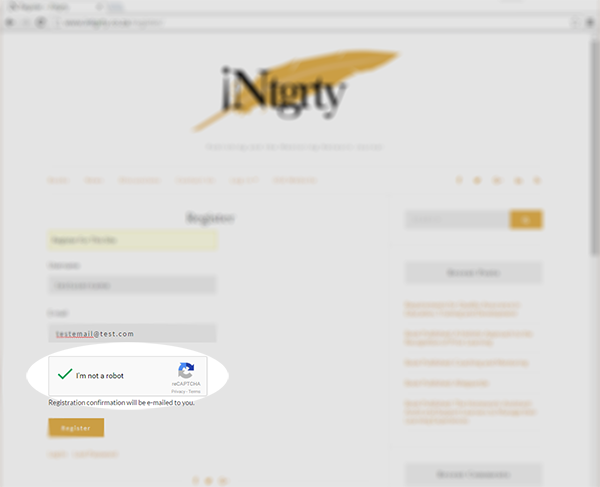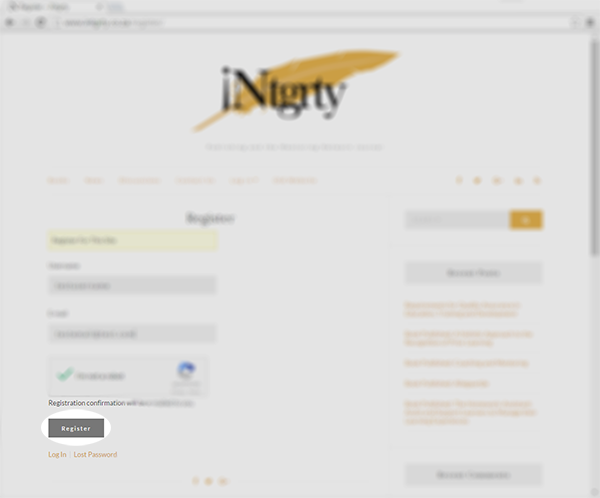
Welcome to the new iNtgrty website.
Visit iNtgrty regularly for new books, news, discussions and tutorials.

Visit iNtgrty regularly for new books, news, discussions and tutorials.

Yes, we are living in interesting times and the world economy is in serious trouble. Private ETD providers are struggling. It is alleged that corruption in government on all levels has finally caught up with those who are involved; government is rerouting National Skills Funds, which is supposed to be used for occupational learning and job creation, to universities; government is said to have instructed their departments and parastatals not to give contracts to any business who are not at least 80% black owned, regardless of their BB BEE status; quality assurance bodies still do not perform as required, etc.
Ironically corruption is escalating because many private ETD providers seem to think that they will survive through bribery. Some government officials are capitalising on this new opportunity to earn lots of money easily and fast. Only last month a senior government official visited me. She told me that she had Rm1.7 left in her skills development budget. She had to spend it before the end of the financial year and she would like me to submit a tender for the training. I’ve had many such offers over the years and I know how they work. They will not ask you for a bribe directly, but if you don’t offer some kind of “finder’s fee” you will not hear from them again. They make the same offer to a number of providers and the one who offers the bribe gets the contract. Needless to say, I never heard from her again.
All government officials are not corrupt. The other day at a church function (nogal) a man asked me what I do for a living. I told him that I own a private training company. He then asked me if I do business with government. I replied that most of our clients are government departments. He responded by insinuating that my business (read I) must be corrupt if I do business with government. I did not even try to convince him that many government officials are still honest and concerned about quality. End of discussion.
Fortunately there are still people in government who are honest and who care about quality. Yes, we also lost some clients. Ironically some of those who expect a bribe come back accepting that we will not pay them a bribe. They still want quality training. Then there are those, and they have been our clients for many years, who do not even think in terms of a bribe. They use our services because they know that they will receive quality.
One SETA, who some years ago decided not to give us any further learnership contracts because we are not sufficiently back owned, even though we have a level 4 BB BEE rating, gave the contracts to black owned providers, some of them not even accredited, on condition that we help them.
An interesting result of this is that the status of our certificates increased substantially. We even get learners who ask if they can swop their certificates, issued by other learning providers, for Mentornet certificates. Of course we don’t do this, but it is good to know that our certificates are valued.
One gets to know people in government, especially quality assurance bodies, D HET and SAQA, who have lots of integrity. They respect us and we respect them. Birds of a feather, you know… I wish I could mention a few names, but with things being as they are one can well set them up as targets for those who work in the dark.
In closing, this year is already a difficult one. All businesses, including private ETD providers, will need to be really creative if they are to survive. Perhaps those who join the corrupt might perform well, but they might also end up in jail. And once you start being dishonest there is no turning back. If you still feel that you can only survive by being corrupt, then go ahead. The choice is yours.
In this tutorial we will have a look at how to register on the iNtgrty website.
You may be asking yourself “Why should I register?” Basically you need to register in order to participate on the website. So if you want to post a comment, reply to a comment or post a news article or discussion yourself then you will have to be registered. If that is what you had in mind then keep reading…
Here are the basic steps you need to follow to register, starting from the iNtgrty homepage (www.intgrty.co.za):
Step 1: Hover the mouse pointer over the “Log in” menu as shown in the image below.

Step 2: The menu should expand, click on the “Register” link as shown in the image below.

Step 3: The registration page should load, insert your registration details into the form as shown in the image below.

Step 4: Click inside the check-box next to the text “I’m not a robot” as shown in the image below.

Step 5: Click on the “Register” button as shown in the image below.

Step 6: The login page should now load. An e-mail will be sent to you with a link, click on the link to activate your account and set your password.
Step 7: Once you open the link sent to your e-mail you will be redirected to the page shown in the image below. The system automatically generates a secure password for you, if you chose to use this password then make sure to take note of it so that you can log in later. Alternatively you can also fill in your own password.

Step 8: Click on the “Reset Password” button, you will be redirected to the login page where you can log in using the details that you have entered.
 It is interesting to see how different countries or groups of countries adopt different strategies to ensure good quality education, training and development (ETD). Some seem to achieve remarkable success while others just don’t seem to make it, or care. Then there are those where political agendas ruin the ETD system of the country. South Africa currently faces immense obstacles of which many of you are probably aware. In this article I will suggest a strategic approach that should help us perform better. Others might be interested in my suggestions even if only to feel good about how well ETD is conducted in their countries.
It is interesting to see how different countries or groups of countries adopt different strategies to ensure good quality education, training and development (ETD). Some seem to achieve remarkable success while others just don’t seem to make it, or care. Then there are those where political agendas ruin the ETD system of the country. South Africa currently faces immense obstacles of which many of you are probably aware. In this article I will suggest a strategic approach that should help us perform better. Others might be interested in my suggestions even if only to feel good about how well ETD is conducted in their countries.
To begin with, quality assurance should rest on a strategy that is articulated to the needs and context of the country. This should start with a strategy for early childhood development and gradually progress to youth development and adult education and training. All of this should fit into, or form part strategies of what one can call a community development strategy. Development should start at an early age already and the stronger the foundation is the better will the end-result be.
Coherence is one of the most important prerequisites for an integrated national strategy for quality assurance. Quality assurance bodies and learning institutions on all levels should have the same frame of reference. The worst possible situation is where different quality assurance bodies are in competition with one another and where individuals in quality assurance bodies set their own quality criteria without consulting anybody and without there being anybody to monitor and control the process. Coherence can be achieved by developing a national quality framework which is supported by lower level strategies right down to the individual learning institutions.
A strategic approach to quality assurance is served best if top-level quality assurance bodies initiate the process by formulating policies and procedures to be supported by lower level quality assurance bodies in a chain reaction that ends at the ETD provider level. This does not mean that higher level quality assurance bodies are exclusively involved in strategy formulation, while lower level quality assurance bodies and ETD providers are exclusively involved in the implementation of strategies. There is, however, a shift in emphasis with higher level role players being more involved in strategy formulation while lower level role-players are more involved in the implementation of strategies.
ETD strategic planning should support human resources development and employment strategies on all levels. This can be achieved if ETD strategies are demand-led on national and industry levels. The quality assurance system should be aligned with the overall strategic goals of the country as well as the industry. This is achieved by determining skills needs at least in cooperation with the industry, i.e. employers if they don’t specify their skills needs, and transforming such skills needs to human resources development strategic objectives, which are integrated with the overall strategic objectives of the organisation.
Government should not dictate skills needs because it can easily lead to the manipulation of the ETD system to achieve political goals. The industry should decide what their scarce and critical skills needs are and government should have bodies, a system and a budget in place to satisfy the needs. Skills needs are the demand for ETD that the industry brings to the attention of learning institutions either directly or via quality assurance bodies. Demand-led quality assurance is a good example of a strategic system where the education and training strategy supports the strategy for the economic growth of a country. It normally aims at transforming the education and training system so that it offers the highest quality and value, and equips young people and adults for employability and personal fulfilment.
A demand-led quality assurance strategy means finding an optimum skills mix to maximise economic growth, productivity and social justice and to consider the policy implications of achieving the level of change required. Government policy and the resulting legislation can easily become an obstacle in the way of demand-led education and training. In their book entitled How South Africa Works (Pan Macmillan South Africa 215: 88) Jeffrey Herbst and Greg Mills wrote that organised labour and the government strategies that do not support skills development and employment can lead to small businesses doing everything in their power not to employ people, while big business invests offshore to protect themselves against uncertainties.
Implementation is the process by means of which the quality assurance strategy is put into practice. It is essential to establish and uphold key principles that underpin the implementation of the planned actions in order to ensure effectiveness in achieving the goals and objectives which have been planned. Such coherence may be achieved in many ways. Funding incentives, the provision of procedural guidelines at the local level, building the capacity of key players on quality issues through ETD, or a combination of internal quality systems at provider level with external inspections, for example, may be used.
In closing, the following are requirements for a quality assurance in ETD:

The A Holistic Approach to the Recognition of Prior Learning book is now available. About this book:
Recognition of prior learning (RPL) is currently enjoying much more international attention than a decade ago. People increasingly realise that RPL is a powerful tool with which to encourage people to become involved in lifelong learning. Learning institutions now realise that learning does not only take place in a formal setting, but also when people interact socially and when people learn in an informal setting.
Topics covered include:
Author: Nel, J.P.
Date Published: 2014-11-17
ISBN: 978-0-620-63007-8 (print)
ISBN: 978-0-620-63008-5 (e-book)
Published By: Mentornet
Number of Pages: 337
R344.00

The Coaching and Mentoring book is now available. About this book:
Coaching and mentoring are often used as organisational interventions in order to improve performance, foster working relationships, and develop employees (and learners). However, there are many aspects one may not have considered before embarking on the role of a coach or mentor. For example, what exactly is the difference between coaching and mentoring? This book aims to delve into the roles of coach and mentor, provide substantial guidance on meeting learners’ needs, and, at the same time, meeting organisational requirements of quality.
Topics covered include:
Author: Menne, B.M.
Date Published: 2014-10-31
ISBN: 978-0-620-63005-4 (print)
ISBN: 978-0-620-63006-1 (e-book)
Published By: Mentornet
Number of Pages: 214
R203.00

The Allegaartjie book is now available. About this book:
Rozet neem mens op ‘n baie persoonlike en emosionele reis met woorde wat reg uit haar hart kom. Jy kan nie anders as om meegevoer te word deur haar ervarings met die liefde en die lewe nie – wat soms pynlik was. Jy lees van seerkry en teleurstelling. En haar worsteling met die diep donkerte waarin depressie haar eens toegegooi het in gedigte soos “ Middernagson”, “Stille Hoop” en “Die skilder”. Maar daar is ook die mooi, die hoop en die vasbyt in “Jy is vir my mooi”, “Vreugde” en “Jy’t sterre in jou hand gehou”. Ons lees van haar hart se punt en sielsgenoot, haar “Chocolate Point” Siamese kat in “Guinivey” en “Welkom tuis!”. Asook haar hartland, soos sy dit noem, “St. Lucia” waarheen sy nog elke jaar terugkeer.
Author: van Niekerk, R.
Date Published: 2014-07-10
ISBN: 978-0-620-61968-4 (print)
ISBN: 978-0-620-61969-1 (e-book)
Published By: Mentornet
Number of Pages: 117
R80.00

he Homework-Assistant book is now available. About this book:
School children of any age often encounter problems with doing their homework and teachers do not always have time to provide them with individualised guidance and support. To teach is to learn twice, and making older children or even the unemployed youth responsible for assisting pupils with their homework eases the guidance and support burden on the teachers, help the children to master their school work and enhances the homework assistant’s own development.
Topics covered include:
Related Unit Standard Number(s): 117865
Author: Nel, J.P.
Date Published: 2013-09-30
ISBN: 978-0-620-58167-7
Published By: Mentornet
Number of Pages: 139
R131.00

The Complete Moderator’s Handbook book is now available. About this book:
Moderation of assessment is the obvious way in which to ensure that students receive the exam results that they deserve after the actual process of assessing student performance. In addition, moderation plays an important role in the improvement of education and training through proper feedback. This book places substantial emphasis on the importance of giving feedback as it applies to higher, vocational and occupational education and training. Topics covered include:
Related Unit Standard Number(s): 115759
Author: Nel, J.P.
Date Published: 2013-04-20
ISBN: 978-0-620-56320-8
Published By: Mentornet
Number of Pages: 256
R241.00

The Leadership in Quality Assurance of ETD book is now available. About this book:
The establishment of a quality culture and a comprehensive and operational quality system requires leaders who care about quality; have an international orientation regarding quality; embed the quality aims in the vision, mission and strategic goals of the institution; are able to motivate and inspire people in the organisation to create a balanced top-down/bottom-up approach to quality, and who base the institutional quality development, improvement and enhancement on the values and culture of the institution. This book is about how leaders in quality assurance bodies, as well as learning institutions, can ensure that quality assurance is conducted in an effective and efficient manner. Topics covered include:
Related Unit Standard Number(s): 15191, 123400
Author: Nel, J.P.
Date Published: 2012-02-15
ISBN: 978-0-620-52656-2
Published By: Mentornet
Number of Pages: 230
R220.00